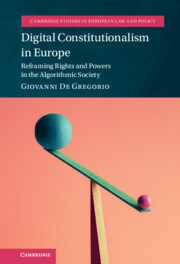It is a pleasure and a privilege to have the opportunity to introduce Giovanni De Gregorio’s book, which, as far as I am aware, is the first monograph to provide a comprehensive analysis of the developing notion of ‘digital constitutionalism’. In writing this book, Giovanni has made four major contributions, thus consolidating his leading position within debates among researchers concerning the relationship between public law and digital technologies.
First, Giovanni looks behind the ‘label’ of digital constitutionalism. Through a highly thoughtful, convincing and innovative analysis, the author seeks to ‘unpack’ digital constitutionalism, by situating this notion within its temporal and material dimension and also emancipating it from a ‘monolithic’ conceptualisation. As he rightly argues, digital constitutionalism should be seen not as a unique concept but as the expression of different constitutional approaches to digital technologies which are connected to political and institutional dynamics.
A second important merit of this book consists of deploying the concept of digital constitutionalism as a core instrument for dispelling the hypocritical narrative affirming that the freedom to conduct business, and even more importantly competition law, should occupy a dominant position in online platform regulation.
In looking at digital constitutionalism as the embodiment of the limits to the exercise of powers in a networked society, Giovanni explores the transformation of online platforms from (simply) economic actors into private powers capable of competing with public authorities. According to the author, this shift has systemic implications. The most important, in my view, is that the constitutional perspective is of an increasingly crucial significance. More specifically, as I have tried to explore in Judicial Protection of Fundamental Rights on the Internet: A Road Towards Digital Constitutionalism? (Hart 2021), constitutionalism has a congenital mission of limiting power. Until recently, the challenge was to limit public (generally governmental) power within the classic vertical dimension: (public) authority versus individual liberty.
As Giovanni persuasively argues, the geometry of power, and the resulting challenge for constitutional law, is becoming more complex and articulated: aside from the vertical dimension, there is a growing horizontal relationship which connects individuals with private digital powers competing with, and often prevailing over, public powers in the algorithmic society. As demonstrated by this book, the core issue at the new frontier of digital constitutionalism is precisely how to deal with the rise of private powers, bearing in mind that there cannot be any constitutional law if the aim is not to protect freedoms and limit power.
As a third point, this research reaches beyond a synchronic analysis of the current conceptual framework and adopts a highly innovative retrospective and prospective approach, which enhances the normative contribution of this research.
Retrospectively, the author demonstrates in an original way how the European approach to online expression and data has evolved since the turn of the century, through the gradual rise of a more constitutional and European institution-based approach. This approach, as Giovanni shows, has two prongs. Firstly, there is a judicial aspect. The Court of Justice of the European Union is finally able to draw on the Nice Charter as a bill of rights, establishing itself as a European constitutional court in the digital age. Secondly, the European approach has a legislative aspect relating to the codification of the ECJ’s case law and the limitation of online platform powers within the framework of the Digital Single Market. In this context, at the end of 2020, the European Commission proposed a new digital package that fits within this framework.
As regards the prospective analysis, Giovanni focuses on the potential path of European digital constitutionalism by addressing three constitutional challenges: digital humanism versus digital capitalism; public authority versus private ordering; and constitutional imperialism versus constitutional protectionism. Facing these apparent dilemmas, the author raises a highly original question about whether the characteristics of European digital constitutionalism will be capable of leading to a European third way (a digital sustainable approach) among these global trends, and how this can be achieved eventually.
Fourthly, and finally, Giovanni has the invaluable merit of further emancipating the debate surrounding law and technology from the still dominant perspective of technocrats, privacy and intellectual property lawyers, by introducing a precious and increasingly necessary constitutional dimension.



